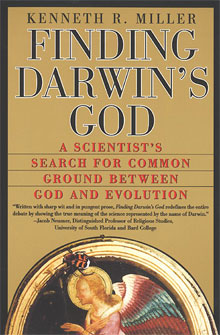Book Notes
 Kenneth Miller, Finding Darwin's God; A Scientist's Search for Common Ground Between God and Evolution (New York: Harper, 1999, 2002), 338pp.
Kenneth Miller, Finding Darwin's God; A Scientist's Search for Common Ground Between God and Evolution (New York: Harper, 1999, 2002), 338pp.
Kenneth Miller has written the the best book to come to my attention on the narrow question of the relationship between evolution and the Christian belief in God as creator. As a professor of cell biology at Brown University, co-author of widely used biology textbooks for high school and college, an expert witness in court cases, public debater on the issues, and a sincere Catholic believer, he is well placed to carry out the task. The standard wisdom of both popular opinion and serious advocates of evolution and creationism is that the two views are radically opposed. In an ironic sense, as Miller observes in several places, this allows extremists in each camp to feed off each other. He writes to refute both.
Within mainstream science, evolution is an established fact far beyond any doubt, so much so that many scientists now refuse to participate in debates or serve as witnesses in legal cases because they feel that to do so lends credence to the argument that the theory is somehow up for grabs. It is not, and in his first two chapters Miller rehearses the overwhelming evidence for descent with modification. So far so good. But within his own scientific community, Miller admits that there is a broad, deep, and unwarranted assumption that his colleagues attach to evolutionary theory, namely, philosophic naturalism, materialism, or atheism. The unfortunate consequence of this radical bias is that Christians then react by trying to disprove evolution, a task that Miller sees as futile, irrational, and unfortunate for the cause of the Gospel.
In the heart of his book, Miller devotes successive chapters to reviewing and dismantling three anti-evolution views, from the most to the least hostile to science—the Institute for Creation Research and the young earth crowd as represented by Henry Morris; Berkeley law professor Phillip Johnson and the intelligent design movement; and then biochemistry professor Michael Behe and the idea of irreducible complexity (chapters 3–5). He then asks what generates such passion and persistence on the part of sincere and intelligent people to try to disprove an established fact? Scientists themselves are largely to blame, he suggests, and in a subsequent chapter he exposes the unveiled disdain for religion that runs rampant in his guild. With generous doses from the writings of Dawkins, Dennett, Gould, Provine, E.O. Wilson, Lewontin, and Futuyma, he documents this "reflexive hostility" toward religion. These samples of the scientific condescension toward religion are not exceptions or aberrations but rather a "fabric of disbelief." Scientism, the conviction that science is the only or best source of reliable knowledge is endemic among scientists. No wonder, he concedes, that religious people are deeply suspicious of a scientific theory that is otherwise beyond debate.
In his final three chapters (7–9) Miller turns to the indeterminacy of quantum mechanics to establish the unpredictability and openness of the natural world, which is to say that a closed, deterministic system of strict materialism is demonstrably false, and not only false with our present state of knowledge but false in principle. This by no means proves the existence of God, he admits. In a final move, he appeals to the so-called "anthropic principle" to support theism. Important scientists like Stephen Hawking and Freeman Dyson have endorsed this line of reasoning, and the vocal and rather specious appeal of Daniel Dennett to parallel universes might hint at just how powerful the anthropic principle is (or Francis Crick's appeal to panspermia, for that matter). In the end, the scientific method, so successful in its restricted domain, has little or nothing to say in the realm of philosophy, ethics, or the meaning of life, for those important matters, so rightly and deeply important to every human being, lie far outside the scope of the scientific method.


